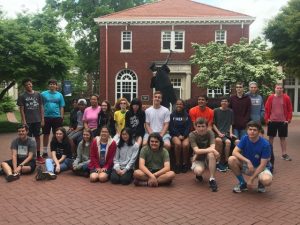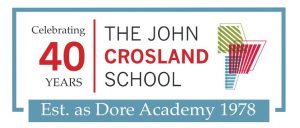By Smarty Guest Blogger Kathleen Walker, K-12 Counselor, The John Crosland School
When planning for college or a career immediately after high school there are many parts of the process that can feel overwhelming for students and families, but for students with learning and attention difficulties, the application process can become even more stressful. Appropriate post-secondary placement for teens with learning differences may mean additional research into academic support services, formal accommodation plans, and intensive executive function support, all of which may be foreign concepts to families with neuro-typical students. Keeping this in mind, as the K-12 counselor at The John Crosland School one of my many responsibilities is preparing students for life after high school (whatever that may include), and in realizing not all readers of this article can relate to the difficulties which come from supporting a child with learning disabilities, I’ve decided to create a more general list of tips and tricks for all families regarding the college and career planning process:
1. Communication is Key
Communicate early and often when establishing expectations for your child’s plan, many families hold different beliefs regarding their child’s future and ensuring you are on the same page as your teen is a big step in understanding the best placement. When discussing next steps, be honest with your teen, let them know your excitement as well as your concerns when determining his or her post-secondary plans. In addition, establish roles and set expectations concerning the application process, specifically, let your child know areas where you plan to help and areas where you want your teen to take the lead.

Students and families browse the booths at the Annual College Fair hosted every year on The John Crosland School’s campus. This year, over 19 colleges and universities were in attendance.
2. Get Informed
Whether your child has a learning difference or not, understanding how your child learns is important in choosing the right program after high school. Is your child currently enrolled in a small vs. a large school community? How does your child’s current classroom environment help or hurt their learning? Does your child benefit from hands-on-learning or can they work efficiently in a lecture style setting? Understanding and accepting your child’s academic strengths will allow you as a parent or guardian to start formulating suggestions for college placement based on your child’s needs. When considering post-secondary placement, take advantage of the resources in your child’s academic community by speaking with his or her guidance counselor and teachers. Guidance counselors are not only trained to assist in the planning process, but they are informed on the most up-to-date policies and procedures at local colleges and universities. In addition, your child’s teachers are able to provide their professional opinion on your child’s strengths as well as his or her academic needs, and teachers may be familiar with post-secondary placements that other students have attended in the past. When exploring college options, there are a number of websites dedicated to college planning; consider using websites like College Board or Common App. to compare colleges from all over the country and save your favorite searches to an individual profile, you can also make use of CFNC’s site which is dedicated to both North Carolina schools and those located outside the region.

Students in our Upper School visited Queens University of Charlotte, receiving an admissions tour as well as a presentation from the Support Services Coordinator on campus.
3. Make a Plan
Start your research early! As your child enters the ninth grade, make sure you consider the following: How is GPA calculated at your child’s school? Which academic courses are offered and how they will prepare your child for post-secondary learning? What academic services does your child need (tutoring, formal accommodations, etc.)? Once you have an idea of your child’s academic needs and interests, research as a family local colleges and universities as a start to the planning process. When considering programs, explore the factors which will help your child determine their best fit, i.e. academics, location, cost, financial aid, support services, size, etc. As your child enters 11th grade consider a standardized test timeline as most teens will take the SAT or ACT two to three times before they begin the application process. Another portion of the planning process includes college visits; families should consider visiting a variety of college campuses as early as junior year to help students visualize what college life is really like and which characteristics matter most to them. When visiting campuses, understand that admissions counselors will arrange for tours throughout the year, but you can also organize a visit to the disability services center or request meetings with specific department faculty and staff to get a deeper understanding of the offerings on campus. Discuss application requirements throughout your child’s high school career, keeping in mind that your family’s preparation doesn’t turn into unhealthy pressure as the application process can be very stressful for teens and their families, so spacing out the work and remaining open-minded throughout the process is highly recommended.

Small groups of Upper School students tour the University of North Carolina, Charlotte’s campus via an admissions tour.
4. Understand your child is unique and his or her path doesn’t need to look like everyone else’s
As tempting as it may be to push your child into the most rigorous or competitive setting, keep in mind your child’s future goals and consider the variety of ways they may achieve them. Don’t be afraid to ask for help from professionals when it comes to the planning process, be it through academic services at your child’s school, through tutors outside of traditional programming, or via your child’s guidance counselors and learning support specialists. College is just one of the many offerings available to students after high school, so don’t feel pressured to enroll your student if they require an extra year to get acclimated or if instead the pursuit of a career is best for their ambitions. Remember to follow your plan but know it’s okay to make changes or even start the planning process over because ultimately, everything your family is working towards is finding the program that is best for your child.
Kathleen Walker is the K-12 Counselor at The John Crosland School, a college preparatory program dedicated to serving students with learning and attention difficulties as well as students with high functioning Autism Spectrum Disorder. For more information about learning and support offerings specific to students in grades 9-12, please feel free to reach out to Kathleen at kwalker@johncroslandschool.org or explore the school’s website for more information.
The John Crosland School
5146 Parkway Plaza Blvd.
Charlottte, NC 28217
704-365-5490 ext 709
Website
Blog
Facebook
Instagram: @johncroslandschool and @dogsofcrosland
Twitter: @croslandschool



